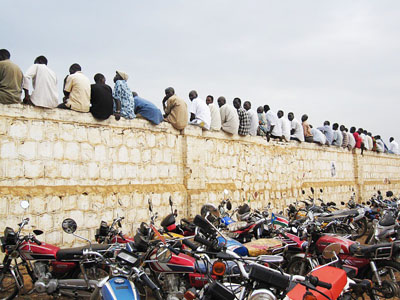
Water is life. This is a common adage in many African societies, particularly among those groups (such as the Tuaregs of the West African Sahel) for whom access to water is extremely difficult. From my experiences in East and West Africa, I’ve found that another phrase also holds true in many places: “politics is life.” As a current resident of Juba, the capital of southern Sudan, I have noticed that politics infiltrates many aspects of life, and that my own enjoyment of “talking politics” is shared by many fellow Juba residents, from elderly men reading newspapers to younger men arguing over a game of cards at a neighborhood bar. (Sudanese women tend to be less often seen discussing politics in public).
Although I can’t claim to understand many of the boisterous conversations I overhear in local languages such as Dinka and Bari and in “Juba Arabic” – the lingua franca of Juba’s melting pot population from North and South Sudan and many other East African countries – I do imagine that many of them revolve around the latest political hot topics in Sudan, such as the issue of “independent candidates” contesting in elections in the South.
Politics is life in Juba, because politics is inextricably linked to the fate of southern Sudan – which will be determined, its people hope, in a free and fair self-determination referendum in January 2011. Politics in Sudan is unpredictable, which is why tensions surrounding political exercises such as the April elections and next year’s southern referendum have the potential to ignite into violence before, during, or after these key milestones called for in the Comprehensive Peace Agreement that in 2005 brought to a close the bloody civil war between North and South.
As the campaign season heats up, I’ve been asking fellow Juba residents over the past week how they feel about the elections and the politicians competing for their votes. What follows is my own highly unscientific sampling of popular opinion, based on conversations with friends, strangers, and people I happen to be interviewing for my ongoing elections-related research:
“Yes, the campaigning is there but look at it…It is just about telling people, ‘do this, do that,’ not consulting with them.”
“Vision and Mission [the slogan of Salva Kiir, incumbent candidate for the Government of Southern Sudan presidency]…what does this mean? I am not convinced.”
“Freedom means what? It means choosing. That is what the southern Sudanese have the right to do.”
“Yassir [Arman, SPLM candidate for the national presidency] is not experienced enough. I don’t think he can be president of Sudan.”
“SPLM [the ruling party in the South] has a very arrogant culture. These leaders are not living in the reality of this situation today. Things have changed [since the war].”
“‘New Sudan,’ it failed. It means what?”
“I am more optimistic than I used to be. People are calm, also they are accepting the mistakes of their politicians [in the South]…but maybe this is because [other politicians] want to avoid the blame for their own mistakes.”
"I think Omar needs to continue [as President of Sudan] until we [the South] leave them [the North] in 2011. The politics of that one of the SPLM [Yassir Arman] are confusing."

